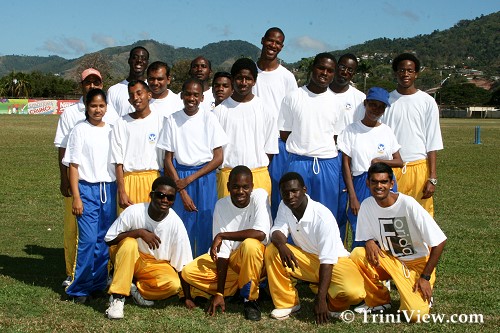 National Centre for Persons with Disabilities (N.C.P.D)
National Centre for Persons with Disabilities (N.C.P.D)
TriniView.com Reporters
Event Date: April 01, 2007
Posted: April 07, 2007
On Sunday 1st April, 2007, Special Olympics Cricket Festival 2006 was finally held after postponement due to the heavy rainfalls of last year. This event was held in the open fields of the Fatima College Grounds, Mucurapo Road, from about 9 a.m. in the brilliant sunshine, with pitches properly demarcated and athletes ready for action.
Busloads of Special Olympics athletes arrived at the grounds from about 8 a.m. and immediately registered and had their breakfast before the games begun. The six participating teams were Happy Haven, National Centre for Persons with Disabilities (N.C.P.D.), St. Dominic's Home, Memisa Centre, St. Mary's Children's Home and Goodwill Industries. The athletes trained year-round for the opportunity to compete in Special Olympics and demonstrated their talent throughout the day.
This event was organized largely by volunteers who dedicated time and effort to ensure that these games came off successfully. Some of the people involved in the organizing of the event were: National Director of Special Olympics of Trinidad and Tobago, Mr. Patrick Rouse; Mr. Ferdinand Bibby; Ms. Rhona Harris; Ms. Grace Ruiz; and master of ceremonies and sports broadcaster of the day, Ms. Abbi Barnes.
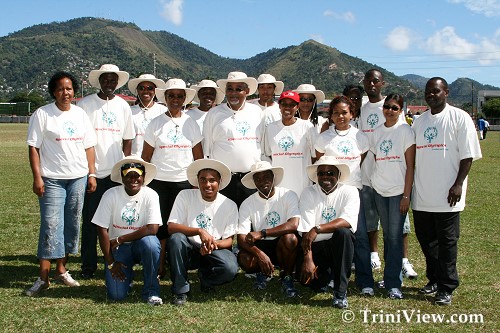 Volunteers at Special Olympics Cricket festival 2006
Volunteers at Special Olympics Cricket festival 2006
TriniView.com spoke to two members of Special Olympics Organizing Committee in order to find out more about Special Olympics. The first was Ms. Grace Ruiz, who has been a volunteer for over nineteen years. According to Ms. Ruiz, there are approximately seven hundred athletes who are active in Special Olympics Trinidad and Tobago and there are two main events that take place annually: in the earlier half of the year they hold the national games where they have about twelve different disciplines including football, volleyball, basketball, swimming, gymnastics, power-lifting, track and field, equestrian sports and gymnastics; and later on in the year there are floor-hockey games and cricket.
Ms. Ruiz is also the chairperson of the volunteers and is responsible for recruiting and assigning volunteers to the various areas where they are needed in the different committees and in different disciplines. She said that volunteers are always needed in all the various fields and there is usually a request for them for the national games. The volunteers undergo orientation and are placed in different areas such as preparing the facilities before the games, registration (for athletes as well as volunteers) and ceremonies (responsible for the march past and other entertainment). During the year, other teams from the Caribbean are sometimes invited to take part in their activities and volunteers are needed to act as house mothers and fathers during their stay; technical workers are needed to assist in scoring; assistants are needed on the field; medical personnel; security; and any other area that the volunteers wish to engage in.
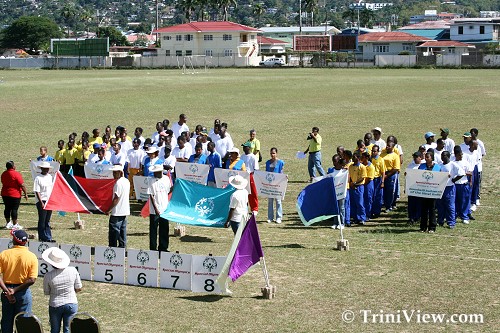 Teams for Special Olympics Cricket Festival 2006
Teams for Special Olympics Cricket Festival 2006
Every four years, Special Olympics athletes take part in the International Special Olympics and, according to Ms. Ruiz, the team comes back with medals demonstrating their skill at these games. However, the games are not recognized by the public and there is need for the promotion of these events and exposure of athletes to the public.
Mr. Patrick Rouse, the national director of Special Olympics Trinidad and Tobago also explained to us the history of the event. He stated that it was the 2nd Annual Cricket tournament that the athletes participated in this year (the 2006 games). Mr. Rouse also informed us that cricket as a sport in Special Olympics was launched just last year and is already an international event. Last year, a team of cricketers from Trinidad and Tobago (representing the West Indies) went to Mumbai, India, to participate in the launch of Special Olympics International Cricket and did very well.
Special Olympics Trinidad and Tobago, according to Mr. Rouse, is celebrating its 25th anniversary this year and the 2007 national games will be held on the 4th, 5th and 6th May, 2007. Later on in the year, as Ms. Ruiz mentioned earlier, there is the Winter Olympics sport of floor hockey (a variation of ice hockey) and cricket. Floor hockey is the only Winter Olympics sport that our team participates in but we have excelled, so much so, that two years ago, our team participated in floor hockey games in Nagano, Japan and this year they will be participating in the world games in Shanghai, China, on the 2nd of October.
Also mentioned was the motor activity training programme for the lowest-level functioning athletes who are challenged both physically and mentally so that they could develop their motor skills.
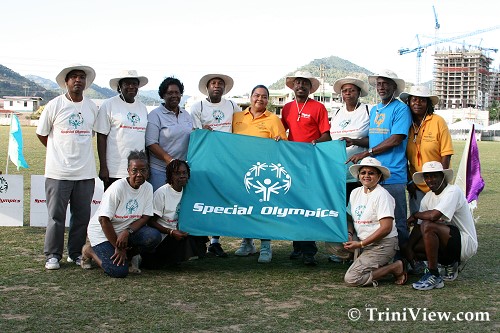 Members of Special Olympics Cricket Organizing Committee
Members of Special Olympics Cricket Organizing Committee
Mr. Rouse also explained some of the challenges in staging the games: the greatest one of which is the human resource aspect, especially since Special Olympics is a voluntary organization and there is need for a continuous supply of volunteers who are willing and able year-round. This year, the challenge of funds has been overcome by Digicel who sponsored Special Olympics Cricket Festival 2006 as well as the national games; the Ministry of Sport who continues to supply them with subvention; and the Sport Company of Trinidad and Tobago. There is also a problem of lack of public support which is experienced all over the world in Special Olympics.
Before the games begun, Special Olympics Cricket Festival 2006 started off with an opening ceremony which included a march past by the participating teams lead by the national flag of Trinidad and Tobago and Special Olympics flag. After the national anthem was sung, one of the athlete's recited Special Olympics Athlete's Oath: "Let me win; but if I cannot win, let me be brave in the attempt." Soon after the opening ceremony had ended, the cricket games had begun.
Special Olympics Cricket Festival 2006 began with members of the six teams participating in the skills activities which were individually evaluated. Teams competed in batting, bowling and fielding and were judged according to how close they met the designated mark. Separate areas were set up so that these activities could have taken place simultaneously and technical volunteers, who were previously briefed on what to look for, were present to observe the activities and score the athletes according to the stipulated point-based system. At the end of the scoring, the placement of the participants was determined.
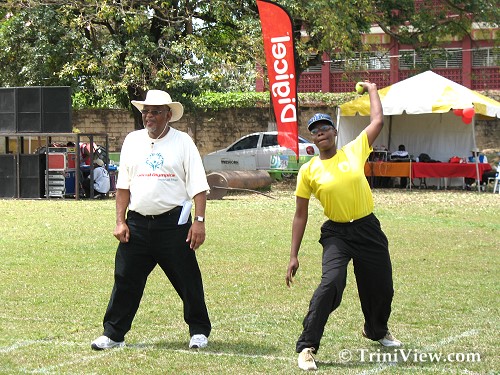 Member of the St Dominic's Home Cricket team participates
Member of the St Dominic's Home Cricket team participates
in the Individual skills competition
After the individual evaluations, teams then competed against each other to determine the overall winner. This part of the competition was quite exciting with athletes demonstrating their prowess on the field. Team members supported their teammates on the field, critiqued their plays and commended each others' performances. They demonstrated athleticism and determination during the entire day of cricket at Special Olympics.
The rules of the much-awaited cricket match are as follows: each team was allowed seven players to a side and each player faced two overs with the exception of one player who faced three; for wide balls the batsman/woman was awarded two runs; each player had to bowl once; and the batsman/woman was allowed to run even if they did not hit the ball.
The results of the matches are as follows:
1st match: St. Dominic's (1 for 30 runs) versus Memisa Centre (48 for no wickets)
2nd match: Goodwill (2 for 48) versus National Centre for Persons with Disabilities (69 for the loss of no wickets)
3rd match: Memisa Centre (68 for 2) versus Happy Haven (1 for 69)
Final match: Happy Haven (55 no loss) versus National Centre for Persons with Disabilities (75 for 3)
 Action during the final game between National Centre for Persons with Disabilities (N.C.P.D.) Cricket team and the Happy Haven Special School Cricket team
Action during the final game between National Centre for Persons with Disabilities (N.C.P.D.) Cricket team and the Happy Haven Special School Cricket team
Indeed it was the National Centre for Persons with Disabilities that came out victorious but all were awarded for their efforts. In the Individual Skills Performances, all received prizes: those who placed first, second and third received medals and the others received ribbons. In the teams, Happy Haven placed second, Memisa Centre placed third, Goodwill fourth and St. Dominic's fifth. The Teams were awarded similarly to the Individual Skills Performance awardees: those that came first, second and third were awarded with medals and the teams that placed fourth, fifth and sixth were awarded ribbons.
Special Olympics Cricket Festival 2006 came off quite successfully. The athletes enjoyed themselves, and by the looks on their faces, are anxious for the next round of games that would be held next month. Hopefully, the public would become more aware of these games and would participate in the exciting events beginning with the national games on the 4th of May.
2006 Special Olympics Cricket Festival in pictures:
www.triniview.com/gallery/main.php?g2_itemId=166313
Homepage | Special Olympics T&T | Photo Gallery

Visit our Weblog for the latest articles
Trinbago Pan | Trinicenter | Trinidad and Tobago News | Trini View | Trini Soca
Race and History | U.S.Crusade | Amon Hotep | RootsWomen | Africa Speaks
Rasta Times | Rootsie Roots | HowComYouCom
About Us | Contact Us | Copyright Notice | Privacy Policy
Copyright © 2002 - 2011 TriniView.com
|
